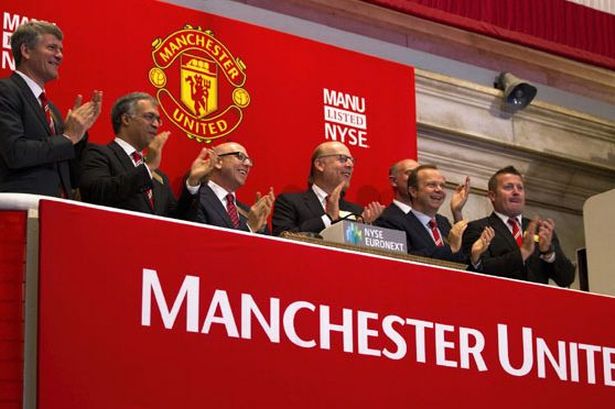
NYSE, Wall St, hedge fund managers, and 700 million more dictate Utd’s success. They don’t care how they get it.
In Radamel Falcao, Man Utd have landed not just a predatory striker but one whose penchant for the spectacular, each goal better than the previous one, makes him a You Tube favourite. Utd will be assured of boatloads of goals with Falcao spearheading with RVP, Rooney just behind, the attack in a 4-3-3 formation. He’s also 29 years old, undergone 3 knee surgeries, and if he does become permanent, cost United about £350,000 in weekly wages making him the club’s most expensive player and an exceptionally risky one. 5 years ago, Sir Alex Ferguson laid down a law, Utd would not trade for players who were over 26 years because of the negative resale value. The last exception, ironically, Dimitar Berbatov, who plies his trade at AS Monaco, Falcao’s former club.
At that time Utd were purring along, the Champions League winners, riding to their third league title in a row, eclipsing Liverpool’s domestic achievements, wearing a distinct British look. Rooney, Scholes, Carrick, Wes Brown, Rio Ferdinand, Darren Fletcher, and Ryan Giggs. No wrinkles to iron out even when at the end of the 2009 season, Cristiano Ronaldo was sold for £80m, Fergie’s rule netting the club, a whopping ROI of £68m just on the transfer purchase. The homegrown core was to continue with Wayne Rooney primed to be unleashed, and over the next few seasons, Tom Cleverley identified as the next Paul Scholes with Chris Smalling and Jonny Evans, as future replacements for Rio Ferdinand and Nemanja Vidic. The train kept a rollin’ all night long without stopping. No delays or derailment. Ferguson even famously said: “We invest in young players,’ he told the gathering at the Player of the Year dinner. ‘That is what we are good at — we’re not like other clubs who can spend fortunes on proven goods. We know that Manchester City are going to pay stupid money, pay silly salaries and all that. We can’t do anything about it.” The class of ’92 would be resurrected in the next generation.
Off the pitch, Utd, league pioneers in branding and merchandising, have become behemoths in commercial revenue and sponsorships, building on their unlimited fan base. According to Kantar, a market research commissioned by Utd, the club is supported by an estimated 700 million worldwide. About the same do not have access to clean water. Both are staggering figures but one can bet out of them some will go thirsty than give up a Utd game. Not coincidentally, that number was polished up and offered to investors as Utd made its IPO pitch. And who loves big figures? The USA. They may not know soccer or football but they know winning brands and how to hitch their wagons to one. In 2012, Utd went public, trading on the NYSE. A year later, they became the first sports team to crack the $3 billion valuation. A month ago, Adidas swooped to pick up Nike’s jersey sponsorship due to end in 2015, paying out $1.2bn for the next 10 years, yet another record.
What’s happening in reality, is on the pitch. The question is not Utd finishing seventh or Moyes being an ineffectual manager, the club have stopped putting the fear of god into the opposition. A good half of their wins came through this perception, this inevitability of defeat, no matter how well you played. Now, they look like a bunch of Orcs, faces glistening with fear, found out by the ghost army. More troubling was Utd’s stepsister image, being rejected by Fabregas, Tony Kroos, Mats Hummels, and Arturo Vidal. Louis Van Gaal is a fantastic manager but he’s trying to teach a new philosophy which might work in the long run but the British core has been found severely wanting. Cleverley is the subject of endless derision, Rooney looks slow and laboured, Chris Smalling and Jonny Evans are no match for Rio Ferdinand and Nemanja Vidic at their prime. Michael Carrick is injured. The situation is reminiscent of bad sub prime mortgages bundled up as shining investments setting off the whole 2007 meltdown. The giant needs to be fed, Wall St appeased, because right now, hedge fund managers are betting against the stock. Moyes departure triggered calls for a SEC investigation as hedge funds stopped short selling and the stock rebounded. Juan Mata was a panic button buy but the parade has not stopped with Marcos Rojo, Anders Herrera, Angel Di Maria, Daley Blind, and now Radamel Falcao, an international outcrop costing $200m. The pattern seems to follow cues laid down by Wall St. Luke Shaw, is the quaint nod to organic, again from a club that has taken over the mantle of homegrown talent but suffers no illusion of being subjected to the phenomenon of utilization. The British are getting bit parts, small looks, and fleeting nibbles.